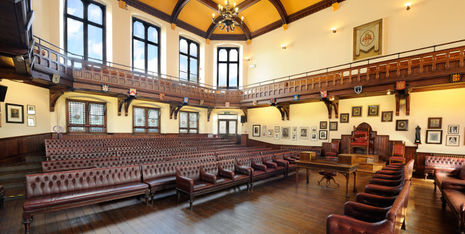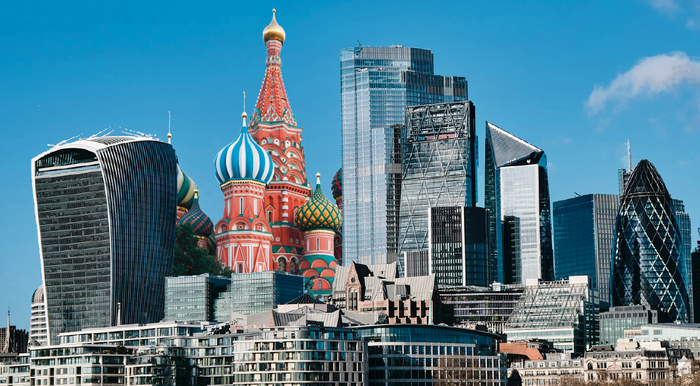This House believes it is the centre of the universe
Columnist Maia Livne explores the psychological peculiarities of Cambridge Union members, and how they led the society to debate sending troops to Ukraine

Content note: this article contains discussion of war, and a brief mention of spiking
Vladimir Putin probably anticipated that this would be a slightly challenging week, but little did he know that invading Ukraine and killing innocent civilians would not go by without a strong response from the Cambridge Union, in the form of - yes, challenging times do demand crafting creative new approaches - a debate. You might be thinking: uhh what? People are dying, the world’s future is facing truly terrifying threats, and these students think that debating is somehow helpful - or at least not completely insensitive and awkward? Worry not! In their Facebook post the Union declared their intention to handle the debate with the “seriousness and solemnity that the situation deserves” and though it is actually touching to see a budding Facebook page manager exploring the palpitating powers of alliteration patterns, whether any Union debate can treat a real-life war with the deserved ‘seriousness and solemnity’ - remains an open question.
“The Union’s members know that debate does not solve problems”
It is no surprise that the Union’s decision to hold the debate upset many people. The Union may be a nice, fascinating, and enriching experience (I wouldn’t know, I don’t pay to be in unions) - but it is still a debating society, and it makes sense that people don’t like seeing such grave and sensitive issues discussed in a society event. “We continue to believe that what we do matters” - said the Union’s Facebook post, and that just might be the problem. Because paying £200 and dusting off your high school debate club rhetorical tool-kit does not make you an expert on the real world, but rather atrophies your grasp of it. And to be fair, kids who can’t handle impressions of dead dictators gracefully maybe shouldn’t try to dabble in issues of living ones.
No one believes the Union is responsible for restoring world peace or solving the climate crisis. However, what might be beneficial, would be if the society channelled the incredible analytical skills of its top debaters and read the room. The war in Ukraine is killing and hurting innocent people on both sides, it is risking family and friends of people in the Cambridge community and threatening the world order as we know it and the directions in which we hope to see it evolve. A debate does not offer any change, or comfort, but rather transmutes the violent nature of war into a verbal play, paralysing us in the inflexible state of mind where the combat between two sides must end in victory and defeat.
The debate motion itself - ‘This House would send troops to Ukraine’, encapsulates this mindset, discussing only the possibility of physical involvement in the war and not exploring the incredibly complex tapestry of diplomatic, civil, and social processes involved in the situation. Though the debaters did honestly attempt to discuss the matter respectfully, bringing up the real suffering of the war’s victims and attempting to analyse the larger global consequences of a Western military intervention or lack thereof, the debate format is such a limited one that it cannot possibly be applied to such a vast, delicate, and complex issue.
“The debate format cannot be applied to such a complex issue”
So what could work? The Union, which has hosted many types of events, probably could have thought of a more sensitive and discursive format. Another Union, for instance, hosted a panel, a more humble approach which acknowledges that we all have much more to learn on the situation. Discussion groups, panels, or talks may have been more suitable. And since the Union is so committed to what “matters” - maybe it would have mattered more to organise a donation and support event and not only attach the link to the British Red Cross Ukraine Appeal as an afterthought, after defending the debate as a “pillar of a healthy democracy” throughout the whole post.
To believe that the best solution is debate is yet another demonstration of how a group of 20 year old students living in a quaint little town frantically believe that their half-formed thoughts are the world’s strongest source of power. And though living in Cambridge does shrink the proportions of the world into the universe enclosed between Hot numbers and Waterstones, it is important to recall the real weight and effect of things sometimes. The Cambridge Union’s members know that debate does not help solve real problems. If they did, they would hold debates on issues that are happening immediately around them, such as spiking, for instance. But it is easier to claim what you do matters when the outcome is so blurred and immeasurable. This is not to claim that the Union should be banned from hosting such a debate - but for sure the society could and should have done much better. This is not a promotion of censorship but of respect. Maybe the ongoing discourse about sensitivity of speech has oversaturated us so that we think any request for sensitivity is an attack on free speech, but that is not the case. Some occasions still require more thought and reflection about the way in which we choose to discuss them than others. At the end of the day, healthy free speech also involves free listening and learning - so maybe before the next emergency debate regarding a global disaster, this House should relax a bit.
 Features / Beyond the porters’ lodge: is life better outside college?24 February 2026
Features / Beyond the porters’ lodge: is life better outside college?24 February 2026 News / Cambridge academics sign open letter criticising research funding changes22 February 2026
News / Cambridge academics sign open letter criticising research funding changes22 February 2026 Theatre / Footlights Spring Revue? Don’t Mind if I Do!25 February 2026
Theatre / Footlights Spring Revue? Don’t Mind if I Do!25 February 2026 News / Cambridge and Manchester Universities meet for innovation partnership26 February 2026
News / Cambridge and Manchester Universities meet for innovation partnership26 February 2026 Fashion / The evolution of the academic gown24 February 2026
Fashion / The evolution of the academic gown24 February 2026










![How to Create an Attractive Freelancer Portfolio [5 Tips & Examples]](https://www.varsity.co.uk/images/dyn/ecms/320/180/2026/02/vitaly-gariev-ho2tNOWZYXM-unsplash-scaled.jpg)